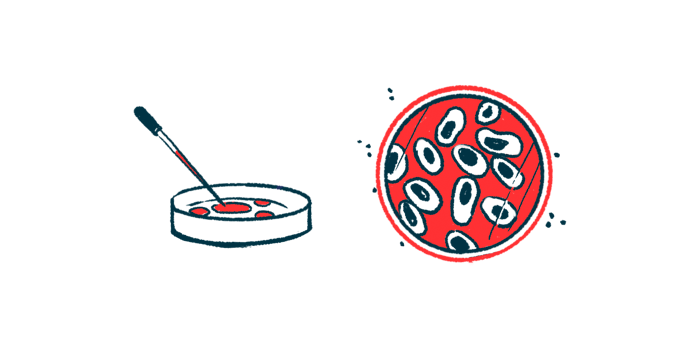Stem cell therapy MSC-NP can ease inflammatory activity in brain cells
Therapy is also being tested in early clinical trials for progressive MS
Written by |

MSC-NP, a form of stem cell therapy that’s currently in early clinical trials for multiple sclerosis (MS), can reduce the inflammatory activity of brain immune cells called microglia, according to a new study.
The therapy is known to reduce disease severity and improve myelin regeneration in animal models of MS, and the findings suggest it may be doing so at least in part by modulating the activity of microglia.
“This research gives us another important layer in understanding of the efficacy of MSC-NP therapy, and potentially furthers our ability to effectively use this therapy to slow the progression of MS symptoms in patients,” Violaine Harris, PhD, a researcher at Tisch Multiple Sclerosis Research Center of New York, and co-author of the study, said in a press release.
“We’re incredibly excited about this development and the opportunity it presents for us to improve regenerative treatments for MS,” Harris said.
The study, “Mesenchymal stem cell-derived neural progenitors attenuate proinflammatory microglial activation via paracrine mechanisms,” was published in Future Medicine.
Mesenchymal stem cells are programmed to grow into neural progenitor cells
Stem cells are a class of cells that are able to grow and differentiate into other cell types. In MSC-NP therapy, a specific class of stem cells called mesenchymal stem cells (MSCs) are collected from a patient.
These stem cells are programmed in the lab to grow into neural progenitor cells (NPs) — more specialized stem cells that can grow into neurons and other types of nervous system cells. The MSC-NPs are then injected into a patient’s nervous system through the spine, called an intrathecal injection.
MSC-NP treatment is notably different from autologous hematopoietic stem cell transplant (aHSCT), which is often referred to as “stem cell therapy” in MS. aHSCT is a different procedure that aims to replace the stem cells in the bone marrow that give rise to immune cells.
A Phase 1 clinical trial (NCT01933802) sponsored by Tisch tested MSC-NP therapy in 20 people with progressive types of MS, including four with primary progressive MS and 16 with secondary progressive disease. All received a total of three injections of MSC-NP cells, given directly into the spinal canal three months apart.
Results showed that most patients experienced improvements in their functional abilities following the therapy. In some patients, improvements lasted at least two years.
This research gives us another important layer in understanding of the efficacy of MSC-NP therapy, and potentially furthers our ability to effectively use this therapy to slow the progression of MS symptoms in patients.
Phase 2 study testing MSC-NP against placebo in 50 people with progressive MS
Tisch is now sponsoring a Phase 2 trial (NCT03355365) testing MSC-NP against a placebo in about 50 progressive MS patients, with the main aim of assessing how the therapy affects measures of disability. Results from the Phase 2 trial are expected this year.
In the recently published study, scientists at Tisch conducted a series of cell experiments aiming to better understand the biological mechanisms by which MSC-NP therapy might be beneficial in MS.
“A better understanding of the mechanisms underlying the therapeutic efficacy of MSC-NPs is required in order to optimize this strategy as a treatment for MS,” the team wrote.
The researchers specifically investigated how MSC-NPs affect microglia, a type of resident immune cell in the brain and spinal cord. In MS, these cells become activated to promote inflammation, which is thought to contribute to disease progression.
When the researchers grew microglia in the same culture as MSC-NPs, the microglia showed markedly less inflammatory activity, with reduced levels of pro-inflammatory proteins. Instead, the microglia took on properties that are more associated with tissue repair and regeneration.
“This study is the first to show that MSC-NPs promote microglial polarization from a proinflammatory to a proregenerative phenotype,” the researchers wrote.
Similar results were obtained when the researchers grew MSC-NPs in culture for a time, then removed them and grew microglia in the culture instead. This suggested that the effect of MSC-NPs on microglia was not due to the cells themselves, but rather due to signaling molecules that the MSC-NPs were secreting. This is referred to as paracrine action.
TGF-beta found to be a main modulator of microglia activity
Experiments then revealed a signaling protein called TGF-beta as one of the main modulators of microglia activity. Blocking the activity of TGF-beta, which is made by MSC-NPs, could markedly reduce the anti-inflammatory effect of MSC-NPs on microglia.
“The current study gives important insight into the mechanism of action of MSC-NPs on microglia and suggests that at least some of the paracrine action of MSC-NPs can be attributed to TGF-[beta] signaling,” the researchers concluded.
“As the Tisch Center works toward finding the cause and the cure for MS, this research represents another important milestone in developing even more effective treatments for patients,” said Saud Sadiq, MD, study co-author, and director and chief research scientist at the Tisch.
“We look forward on building on this research to even further enhance our understanding of MSC-NP therapy and its impact on patients, as well as microglia as a therapeutic target,” Sadiq added.

